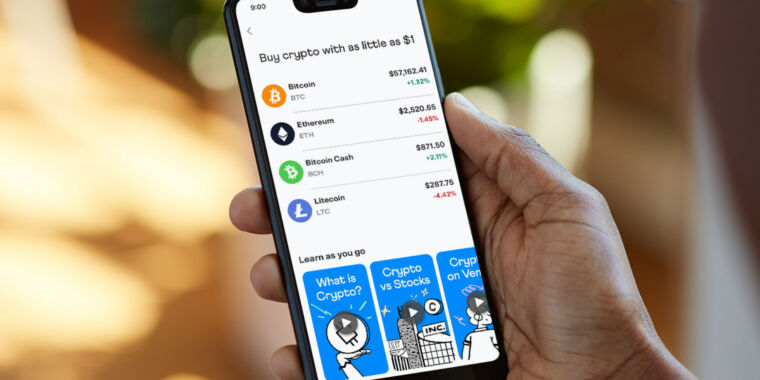
Venmo
The PayPal-owned Venmo service will let users buy, sell, and hold bitcoin and other cryptocurrencies within the Venmo app, the company announced today. “Customers will have the ability to buy and sell cryptocurrency using funds from their balance with Venmo, or a linked bank account or debit card,” the announcement said.
Users will be able to buy or sell bitcoin, ether, litecoin, and bitcoin cash. The feature is rolling out to some users today and “will be available for all customers directly in the Venmo app within the next few weeks.”
When it becomes available, users can get started “by clicking on ‘Crypto’ in the Venmo menu at the top right in the app,” the announcement said. Crypto purchases can be made for as little as $1, but each purchase has a minimum fee of 50¢. Each user is limited to $20,000 in cryptocurrency purchases each week and $50,000 during each 12-month period.
The Venmo announcement did not say anything about paying for goods or services with cryptocurrency, but that ability could come to Venmo later. As CoinDesk wrote today, “PayPal opened trading on select cryptocurrencies to US customers last November and began allowing users to pay with crypto in March.” PayPal says that when users pay with cryptocurrency on PayPal, the service “automatically convert[s] it into USD or other currency at no additional fee.”
No peer-to-peer crypto transactions
At least for now, Venmo does not support peer-to-peer crypto trades or the ability to transfer cryptocurrency from one account to another. “Venmo only supports the purchase and sale of cryptocurrency using your Venmo account,” a Venmo FAQ says. “To complete P2P transactions with Venmo, all crypto assets held with Venmo must be sold and thus converted into USD.”
The ability to hold cryptocurrency in one’s Venmo account only applies to cryptocurrency purchased on Venmo, meaning you can’t transfer bitcoins or other cryptocurrency from other sources into Venmo.
The PayPal and Venmo crypto systems use the Paxos crypto brokerage service. “PayPal was also granted a first-of-its-kind conditional BitLicense by the New York State Department of Financial Services (NYDFS), allowing PayPal and Venmo to offer its customers the ability to buy, sell, and hold cryptocurrency,” PayPal said.
Like PayPal, Venmo is enabling cryptocurrency purchases and sales throughout most of the US but not Hawaii, where the market has some regulatory restrictions. Venmo notes that “buying, selling, and holding cryptocurrencies is not regulated in many states, including the State of California.”
Crypto traders must verify identity
Venmo is not supporting cryptocurrency transactions for business profiles, limiting the ability to individual users. While anonymity is often seen as a key benefit of using cryptocurrency, Venmo notes that its crypto service is only available to US customers “who have verified their identity with Venmo.”
Venmo also pointed out that trading cryptocurrency “may result in significant losses.”
“Venmo will not cover losses from cryptocurrency price fluctuations and we recommend that customers make sure purchasing crypto is right for their individual financial situations,” the Venmo FAQ said. “Since crypto purchases and sales aren’t reversible, Venmo urges customers to do their research and make decisions carefully.” Venmo does promise that “cryptocurrency purchases are protected in the event unauthorized activity takes place.”
Venmo says its fees on crypto transactions generally range from 1.5 percent to 2.3 percent; fees are 1.5 percent on purchases or sales above $1,000; 1.8 percent on transactions between $200.01 and $1,000; 2.0 percent on transactions between $100.01 and $200; and 2.3 percent on transactions between $25 and $100. A 50¢ minimum fee is applied to transactions between $1 and $24.99.
